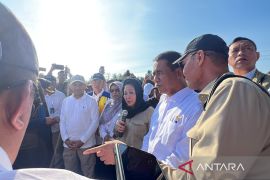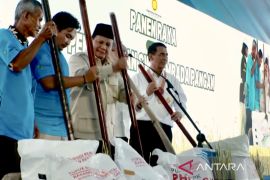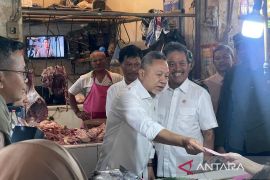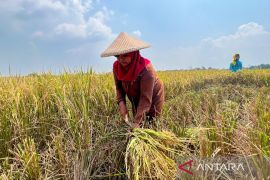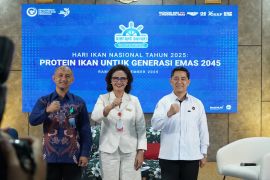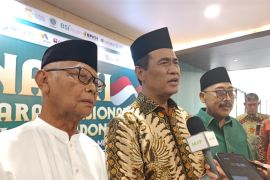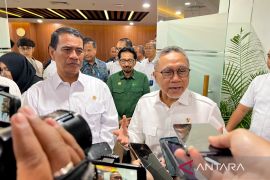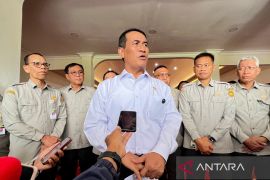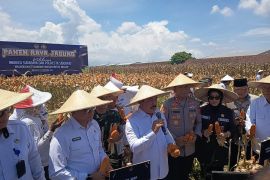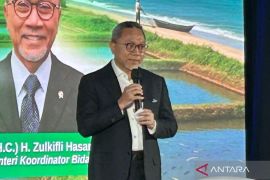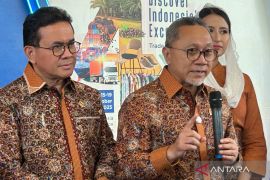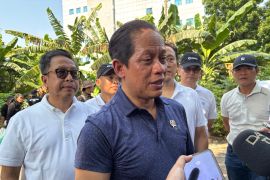Food security can be defined as access to sufficient and affordable food that can relate to a single household in the country.
At a function to open the Farmers-Fishermen National Week 2011 (Penas 2011) at Kutai Kartanegara district town of Tenggarong in East Kalimantan on Saturday, Vice President Boediono said Indonesians should be grateful for being blessed with abundant natural resources.
But he pointed out that the resources should be managed as well as possible for the prosperity of all people across the country.
"To manage our resources, the development of various agriculture infrastructure, especially for food agriculture should be sped up," the vice president said.
He said the development of the main infrastructure was the job of central and regional governments, but in its operational level the involvement of all parties was also needed.
Besides, he said the private parties should also be given opportunities to develop agricultural infrastructure.
Then, the availability of agricultural facilities such as fertilizer and seeds of good quality should continue to be increased, the vice president noted.
According to the vice president, Indonesia should maintain its food security, and therefore it was absolutely necessary to increase food production.
"Self-sufficiency in rice and other staple commodities should be reached and maintained because Indonesia must be safe in food," the vice president said at a function to open the Farmers-Fishermen National Week 2011 (Penas 2011) at Kutai Kartanegara district town of Tenggarong in East Kalimantan on Saturday.
He said Indonesia and other countries face the same challenge of food security and the problem, according to the vice president, was how a country could provide enough food to meet demand that was ever increasing at a fast rate.
According to the vice president, domestic food availability should continue to be maintained and the prices should be kept stable in order to be affordable by all people.
In such a global situation, Vice President Boediono said Indonesia had to secure its food supply as much as possible.
"Food prices are getting more unstable and increasing more and more, and increasingly difficult to anticipate. Such situations complicate all parties: producers, consumers, and the governments of developing countries alike," the vice president said.
He said the fluctuating food prices have a broad impact and often fatal because it would lead to social tension, security and political instability, and an increase in the number of poor people.
"The main step that must be done is to increase domestic food production to meet our own basic needs," Boediono said, adding that self-sufficiency in rice and other basic necessities should be realized.
Even the Asia Development Bank (ADB) has reminded developing countries including Indonesia of the importance of food resilience which was predicted to be a main problem following the increasing world`s population.
"In the short term, food demand of the population may be adequate but it has always been a fundamental issue from time to time," ADB Managing Director Rajat M Nag said in Jakarta recently.
He explained that the population growth in Asia would get higher and therefore food productivity especially rice should be in stepped up.
"Food supply will sooner or later be depleted and therefore it is needful to increase productivity to anticipate food and energy scarcity in the future," Rajat said.
That is why ADB suggested that the government develop green-revolution-based technology and increase agriculturally-based researches.
"It is the most important thing in the future and that the government of Indonesia should focus on agriculturally-based researches to develop prime seeds which are resistant to any climate and pests," he said.
The World Economic Forum on East Asia (WEF-EA) that just ended last week produced a partnership to step up agriculture sector and to help realize food resilience in Indonesia.
"The forum has produced an agreement between Indonesian delegation and WEF participating countries to step up what we say `partnership for Indonesia sustainable agriculture`," Coordinating Minister for Economy Hatta Rajasa said last Monday.
He said the cooperation was formed in the framework of information exchange and initiative implementation to apply sustainability principles for growth of agriculture sector to realize food resilience in a wider sense.
According to Hatta, the partnership has a concrete goal to increase agriculture product by 20 percent, to reduce gas emission by 20 percent, and to reduce poverty rate by 20 percent at rural areas.
"The food resilience in a wider sense is not only for rice, but also for environmental sustainability and economic opportunities for all state holders in agriculture sector by involving the farmers," Hatta said.
He added that it dealt not only with food production but also with primary seeds and food distribution chain.
Te partnership program, according to Hatta, would involve the Agriculture Ministry as government representative with the support of 14 multinational companies.
(O001/A014)
Reporter: Otniel Tamindael
Editor: Aditia Maruli Radja
Copyright © ANTARA 2011
